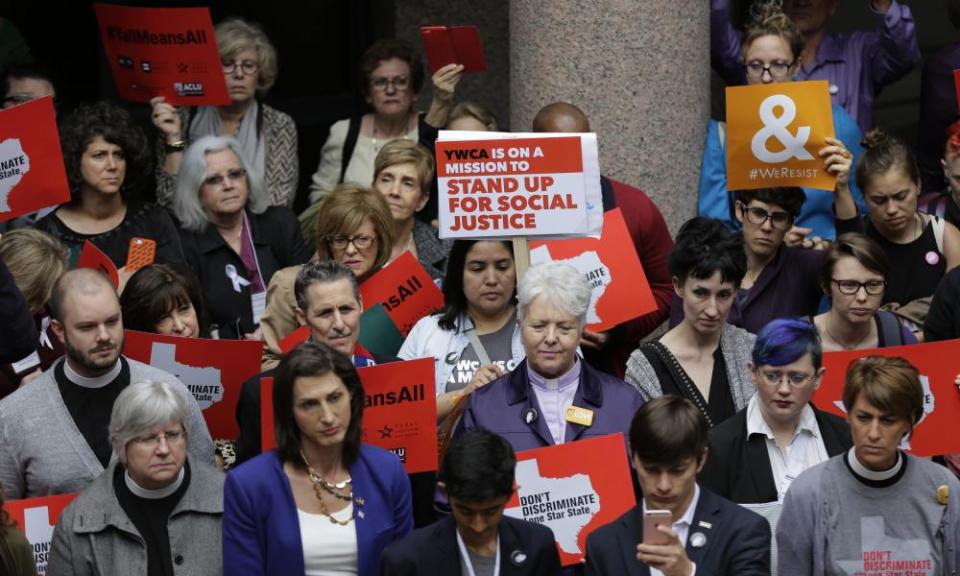Texas to pass bill banning transgender students from choosing bathrooms

Texas is to pass a “bathroom bill” that will ban transgender students from using the restroom that aligns with their gender identity.
Conservative politicians in Texas have agitated strongly for the measure despite the backlash against such a law in North Carolina, which involved economic boycotts and attempts to repeal it after it was introduced last year.
A wide-ranging bill more similar to North Carolina’s that would have affected all public restrooms and preempted local anti-discrimination ordinances was passed by the Texas senate earlier this year but stalled in the state house of representatives, where the speaker, Joe Straus, was worried that businesses and sports events could pull out of the state and damage the economy.
However, a key advocate, lieutenant governor Dan Patrick, threatened to force the extension of the legislative session beyond its final day of 29 May unless a bill was approved.
Lawmakers used a tactic on Sunday night to circumvent the problem of time running out: a bathroom amendment was inserted into an otherwise unrelated bill about how schools plan for emergencies such as natural disasters and bomb threats.
The state house gave final approval on Monday and the bill now goes to the senate – which is also Republican-dominated and expected to back it. The legislation will then head to the desk of the Republican governor, Greg Abbott, to be signed into law.
The author of the amendment, Republican representative Chris Paddie, said it is “absolutely about child safety” and “about accommodating all kids”. Critics charge that the opposite is true: they accuse the law’s supporters of risking harming transgender children by supporting a discriminatory proposal that singles out already vulnerable students.
Senfronia Thompson, a Democratic representative, said during a debate on the floor that the bill evoked memories of when facilities were segregated by race across the country during the Jim Crow era. ”Bathrooms divided us then and bathrooms divide us now … Separate but equal is not equal at all,” she said. Before the debate a small number of female Democratic representatives entered a men’s restroom near the house floor as a protest.
The bill will mean that transgender students at public schools will have to use bathrooms and locker-rooms in line with their “biological sex” or use a “single-occupancy facility” that the school must provide as an alternative. It cites “privacy, dignity and safety”.
“The so-called bathroom amendment approved by the house last night is billed as a compromise, but there can be no compromise on discrimination. Transgender children aren’t bargaining chips for lawmakers to trade,” Rebecca Robertson, legal and policy director of the American Civil Liberties Union of Texas, said in a statement on Monday.
“This is still discrimination, it still can create situations where trans kids are not seen as the same as their peers while they’re at school,” said Lou Weaver, transgender programs coordinator at Equality Texas, an LGBTQ advocacy group.
In February, the Trump administration rescinded guidance issued by the Department of Education and the Department of Justice last May telling schools to provide transgender students with facilities that correspond with their gender identity. Texas led a lawsuit of 13 states that fought the guidelines, which were blocked nationwide by a federal judge in Texas last year.
This year, 16 states have considered introducing “bathroom bills”, according to the National Conference of State Legislatures, and 14 have mulled legislation to limit the rights of transgender students.
Parts of North Carolina’s law were repealed in March, and Texas’s bill is expected to face legal challenges from civil rights groups.
Also over the weekend, the Texas senate voted in favour of a so-called religious freedom bill that opponents say would discriminate against LGBTQ people seeking to adopt children by allowing state-funded agencies to reject prospective parents based on religious beliefs without being sued.

 Yahoo News
Yahoo News 